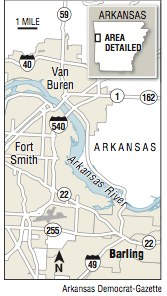FORT SMITH -- Barling officials are reviving efforts to legalize alcohol sales in their town by trying to turn the southern district of Sebastian County from dry to wet.
City Administrator Mike Tanner said he wants to meet with officials of the cities in the part of Sebastian County outside Fort Smith, called the Greenwood district, to gauge their support for an election to make the district wet. Liquor sales are legal in Fort Smith.
Barling's Board of Directors authorized Tanner in its meeting last week to quiz the other cities' mayors about an election. Tanner said he hasn't spoken with any of the mayors yet but may take the opportunity at the Nov. 14 dedication of Barling's new city hall.
Barling cannot act by itself to make the city wet. An election in 2012 to allow alcohol sales in Barling failed even though voters there approved the measure 1,082 to 546.
Ruling in January 2013 on a challenge to the election, Sebastian County Circuit Court Judge Stephen Tabor said the entire Greenwood district would have to vote on the issue since it was the entire district that voted to ban alcohol sales in 1944 by a vote of 1,190 to 463.
Sebastian County has two districts that act as independent counties: Fort Smith and the Greenwood district, which encompasses the rest of the county, including Barling.
Tanner said he thought Greenwood, the largest city in the district with a population of 8,952, would be receptive to the idea of alcohol sales, since the council passed the first reading of an ordinance to allow the owner of a proposed sports bar to apply to the state for a private club license.
The vote on the ordinance at the Oct. 2 meeting was 4-2. Mayor Doug Kinslow said he had to vote so there would be the required minimum of four votes for the ordinance to pass on its first reading. Alderman Lee Johnson was absent from the meeting.
Kinslow said he normally does not vote on council matters but did in this case so the restaurant owner could have the opportunity to apply to the state Alcoholic Beverage Control Administration Division for the license.
The second of three readings on the ordinance is scheduled for the council's meeting Monday.
Kinslow said the sale of alcohol in south Sebastian County is a "hot button issue" and that passage of the ordinance in Greenwood would not be a measure of how the rest of the district would vote on alcohol sales.
"I think the wet issue will meet more resistance than the private club issue," he said.
Retired Greenwood dentist James Burgess leads a group opposed to the ordinance and to alcohol sales. Opponents are circulating petitions and writing letters asking Greenwood aldermen to vote down the ordinance on its second reading, he said.
Burgess said he opposed alcohol sales because the Bible speaks against consumption of alcohol, it can lead to other drugs and crime, and alcohol sales don't necessarily lead to economic growth.
He noted that the restaurant site is on the Arkansas 10 Spur, which is a busy street in Greenwood, is within 1,000 feet of two churches and just down the street from a rest home where some residents have drug and alcohol addictions.
If the vote on alcohol were put to the Greenwood district, Burgess said he felt "very strongly" that it would not pass.
Tanner said alcohol sales would help generate taxes by attracting businesses to the area.
Alcohol sales would be a boost to the Barling economy, said Ivy Owen, executive director of the Fort Chaffee Redevelopment Authority. He said alcohol sales would make it easier for the redevelopment authority to market the Chaffee Crossing land in Barling because it would make the property more attractive to restaurants and hotel developers.
The redevelopment authority owns the land within Barling city limits that once was part of Fort Chaffee but was declared surplus by the U.S. Department of Defense and released for civilian use.
A group of developers in 2011 considered developing a mall on 90 acres of Chaffee Crossing land in Barling that would have 70 stores with major anchor stores and that would employ 700 people.
Developers said key to attracting upscale restaurants and hotels to the area would be the ability to sell alcohol, which could account for as much as 25 percent of a business' revenue.
The mall proposal went dormant when the attempt failed by Barling to allow alcohol sales in 2012.
State Desk on 10/31/2017

